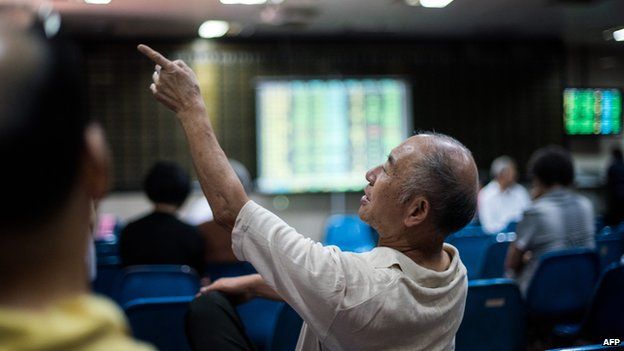Chinese shares hit by weak factory data
- Published

Chinese shares have continued their recent slide after fresh data provided further evidence of a slowdown in the country's economy.
An official survey indicated that manufacturing activity in China contracted at its fastest pace in three years in August.
The mainland's benchmark Shanghai Composite share index fell by 1.2% to 3,166.62.
In Hong Kong, the Hang Seng index dropped 2.2% to 21,185.43.
The slowing of the world's second largest economy and the extreme volatility on the mainland stock markets have weighed on global equities over the past few weeks.
Chinese mainland stocks have been on a steep downward slide over the past few months, shedding almost 40% since June.
Market crackdown
Any fresh indication that China's woes are set to continue is likely to frustrate Beijing's attempts to reassure traders and stabilise the Shanghai and Shenzhen markets.
Authorities have injected money into the markets, allowed the state pension fund to start buying up shares and lowered lending rates.
So far though, none of those measures have managed to push the markets back into positive territory.
China has also cracked down on people accused of spreading online "rumours", and who the authorities say have been "destabilising the market".
The country's state media announced a number of confessions on Monday, including from a reporter who allegedly admitted to spreading false information that had caused panic and disorder.
No rate cut in Australia
Shares were also lower elsewhere in Asia. Japan's benchmark Nikkei 225 index saw the region's biggest losses, closing the day down 3.8% at 18,165.69.
Australia's S&P/ASX 200 ended 2.1% lower at 5,097.40.
Traders in Sydney were cautious as any slump in China is likely to have an effect on Australia, which relies on the country as its main export destination.
The decision by the country's central bank not to cut interest rates also contributed to the downbeat mood.
In South Korea, the benchmark Kospi index also fell, dropping 1.4% to 1,914.23.
Affected by the slowdown in China, Seoul reported on Tuesday that exports fell 14.7% in August from a year earlier, worse than expected and the biggest drop in six years.
- Published1 September 2015
- Published1 September 2015
- Published30 August 2015